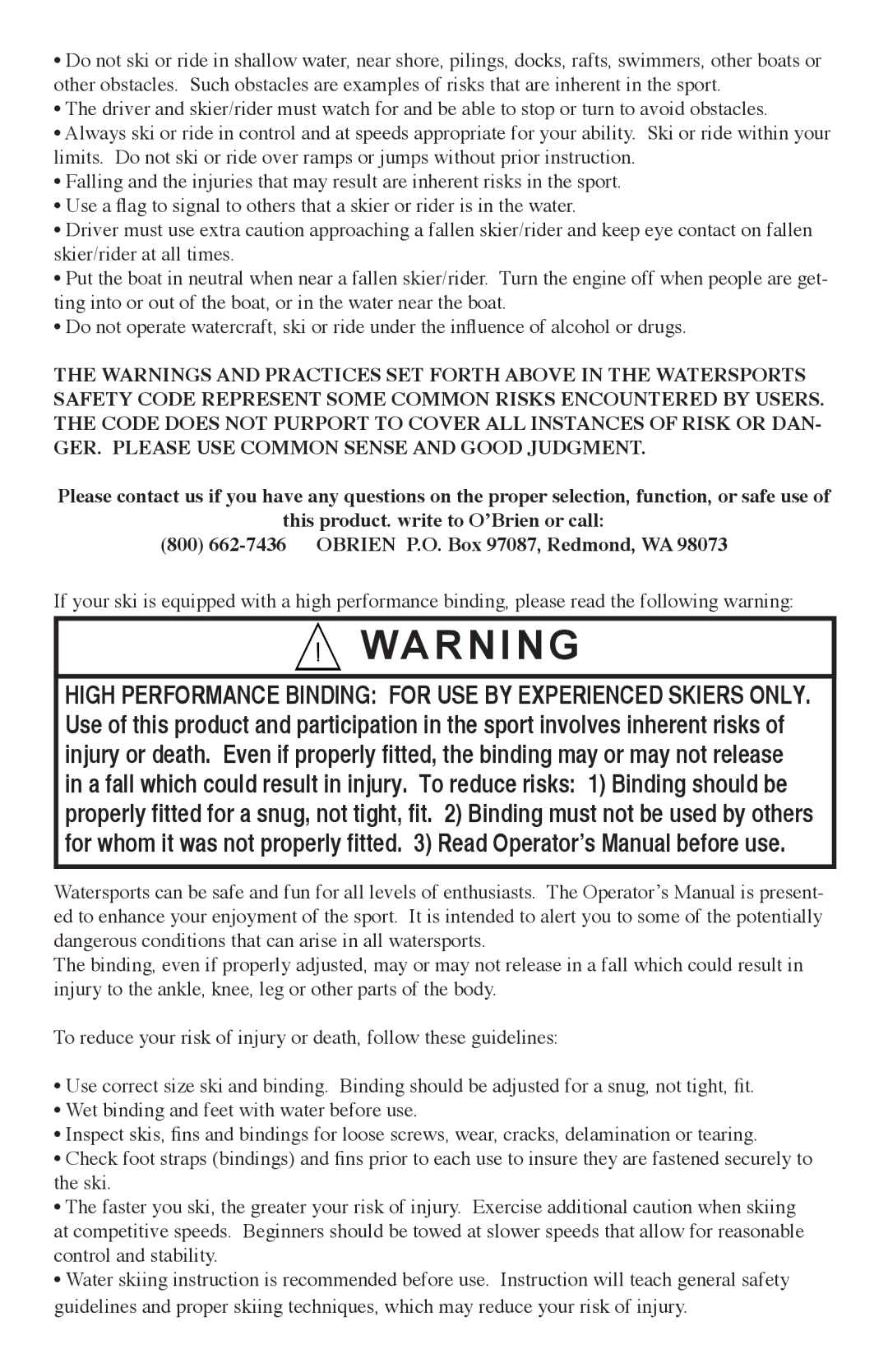
•Do not ski or ride in shallow water, near shore, pilings, docks, rafts, swimmers, other boats or other obstacles. Such obstacles are examples of risks that are inherent in the sport.
•The driver and skier/rider must watch for and be able to stop or turn to avoid obstacles.
•Always ski or ride in control and at speeds appropriate for your ability. Ski or ride within your limits. Do not ski or ride over ramps or jumps without prior instruction.
•Falling and the injuries that may result are inherent risks in the sport.
•Use a flag to signal to others that a skier or rider is in the water.
•Driver must use extra caution approaching a fallen skier/rider and keep eye contact on fallen skier/rider at all times.
•Put the boat in neutral when near a fallen skier/rider. Turn the engine off when people are get- ting into or out of the boat, or in the water near the boat.
•Do not operate watercraft, ski or ride under the influence of alcohol or drugs.
THE WARNINGS AND PRACTICES SET FORTH ABOVE IN THE WATERSPORTS SAFETY CODE REPRESENT SOME COMMON RISKS ENCOUNTERED BY USERS. THE CODE DOES NOT PURPORT TO COVER ALL INSTANCES OF RISK OR DAN- GER. PLEASE USE COMMON SENSE AND GOOD JUDGMENT.
Please contact us if you have any questions on the proper selection, function, or safe use of
this product. write to O’Brien or call:
(800)
If your ski is equipped with a high performance binding, please read the following warning:
![]() WARNING
WARNING
HIGH PERFORMANCE BINDING: FOR USE BY EXPERIENCED SKIERS ONLY. Use of this product and participation in the sport involves inherent risks of injury or death. Even if properly fitted, the binding may or may not release in a fall which could result in injury. To reduce risks: 1) Binding should be properly fitted for a snug, not tight, fit. 2) Binding must not be used by others for whom it was not properly fitted. 3) Read Operator’s Manual before use.
Watersports can be safe and fun for all levels of enthusiasts. The Operator’s Manual is present- ed to enhance your enjoyment of the sport. It is intended to alert you to some of the potentially dangerous conditions that can arise in all watersports.
The binding, even if properly adjusted, may or may not release in a fall which could result in injury to the ankle, knee, leg or other parts of the body.
To reduce your risk of injury or death, follow these guidelines:
•Use correct size ski and binding. Binding should be adjusted for a snug, not tight, fit.
•Wet binding and feet with water before use.
•Inspect skis, fins and bindings for loose screws, wear, cracks, delamination or tearing.
•Check foot straps (bindings) and fins prior to each use to insure they are fastened securely to the ski.
•The faster you ski, the greater your risk of injury. Exercise additional caution when skiing at competitive speeds. Beginners should be towed at slower speeds that allow for reasonable control and stability.
•Water skiing instruction is recommended before use. Instruction will teach general safety guidelines and proper skiing techniques, which may reduce your risk of injury.
